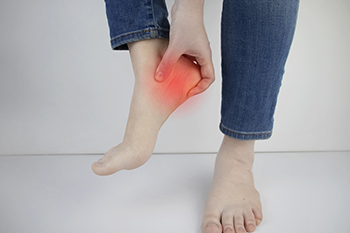
Plantar fasciitis, a common cause of heel pain, can be a debilitating condition that affects daily activities. However, incorporating specific exercises into your routine can help alleviate symptoms and promote healing. Stretching exercises such as calf stretches and towel stretches target the tight muscles and fascia in the foot, reducing tension and relieving pain. Additionally, rolling a frozen water bottle or a tennis ball under the arch of the foot provides gentle massage and helps decrease inflammation. Strengthening exercises like toe curls and marble pickups improve foot stability and support, reducing strain on the plantar fascia. Additionally, practicing foot arch exercises, such as arch lifts and toe spreads, can help strengthen the arch and alleviate pressure on the plantar fascia. Consistency is key when performing these exercises, and it is important to start slowly and gradually increase intensity to avoid making symptoms worse. If you have plantar fasciitis, it is strongly suggested that you are under the care of a podiatrist who can help you manage this condition, which often includes suitable exercises and stretches.
Plantar fasciitis is a common foot condition that is often caused by a strain injury. If you are experiencing heel pain or symptoms of plantar fasciitis, contact Dr. Michael D. Garvin from Florida. Our doctor can provide the care you need to keep you pain-free and on your feet.
What Is Plantar Fasciitis?
Plantar fasciitis is one of the most common causes of heel pain. The plantar fascia is a ligament that connects your heel to the front of your foot. When this ligament becomes inflamed, plantar fasciitis is the result. If you have plantar fasciitis you will have a stabbing pain that usually occurs with your first steps in the morning. As the day progresses and you walk around more, this pain will start to disappear, but it will return after long periods of standing or sitting.
What Causes Plantar Fasciitis?
- Excessive running
- Having high arches in your feet
- Other foot issues such as flat feet
- Pregnancy (due to the sudden weight gain)
- Being on your feet very often
There are some risk factors that may make you more likely to develop plantar fasciitis compared to others. The condition most commonly affects adults between the ages of 40 and 60. It also tends to affect people who are obese because the extra pounds result in extra stress being placed on the plantar fascia.
Prevention
- Take good care of your feet – Wear shoes that have good arch support and heel cushioning.
- Maintain a healthy weight
- If you are a runner, alternate running with other sports that won’t cause heel pain
There are a variety of treatment options available for plantar fasciitis along with the pain that accompanies it. Additionally, physical therapy is a very important component in the treatment process. It is important that you meet with your podiatrist to determine which treatment option is best for you.
If you have any questions, please feel free to contact our offices located in Port St. Lucie, FL . We offer the newest diagnostic and treatment technologies for all your foot care needs.
